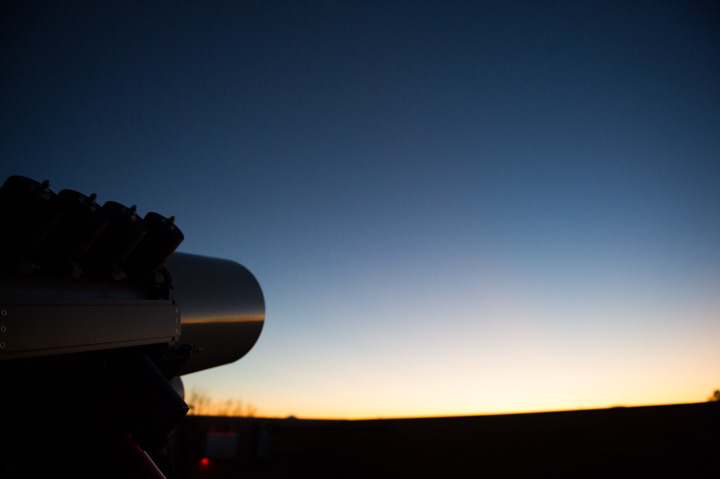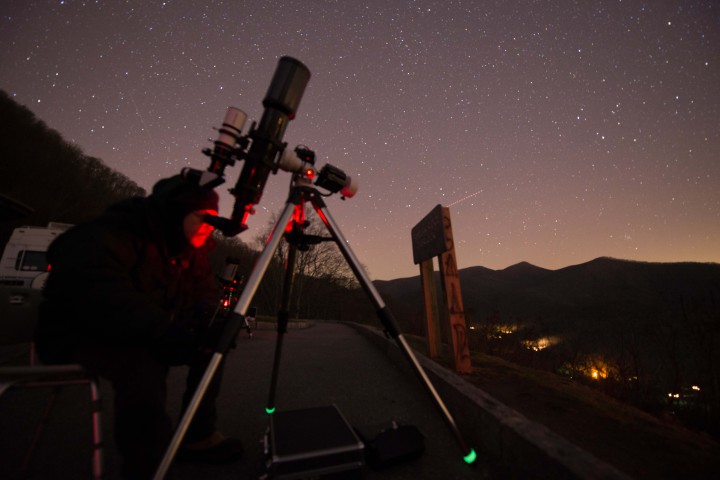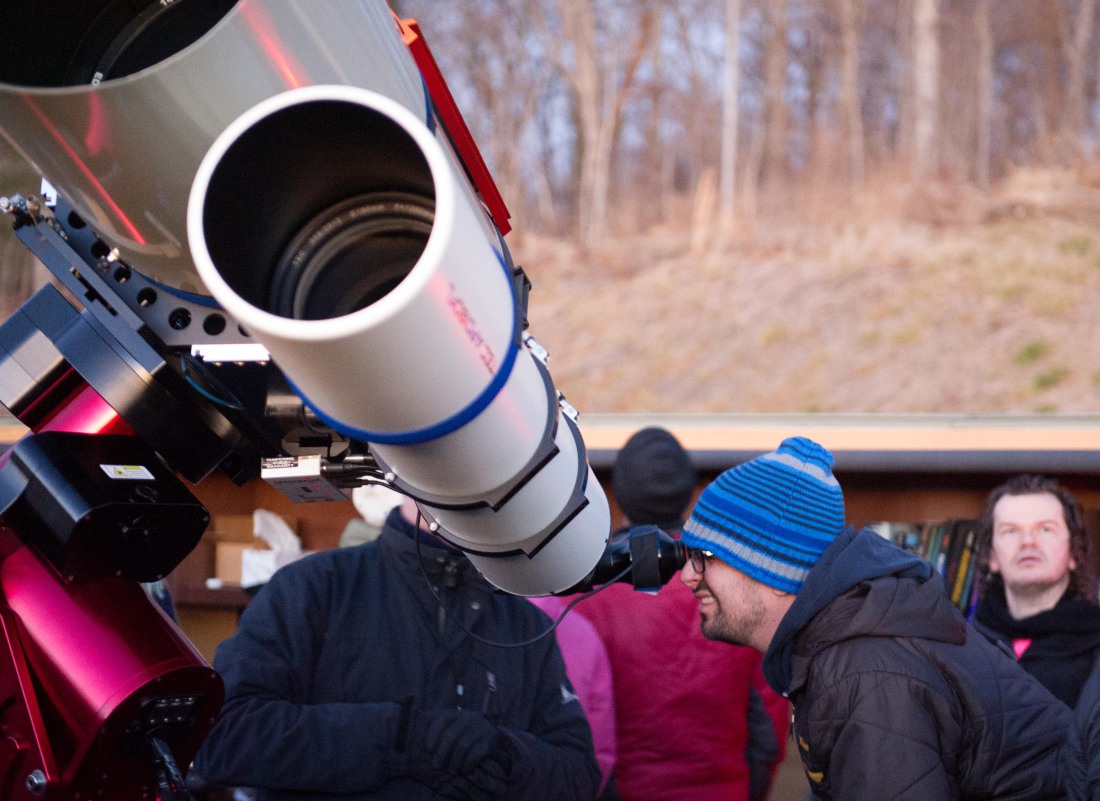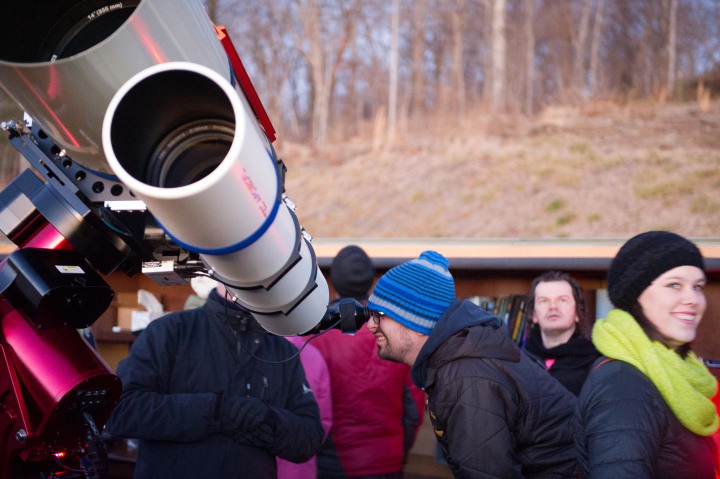To gain perspective on one’s life, sometimes a look skyward into the inky nocturnal abyss is all it takes to realize just how small we really are.
“Life is more than about just meeting a certain deadline at work,” said Dominic Lesnar, the president of the Astronomy Club of Asheville. “It’s great to see the bigger picture of how the world operates. This is the satisfaction of knowing your place in the universe and seeing how dynamic the natural world is.”
The Astronomy Club invited a whole lot of people to look up when it celebrated its second public stargazing event Jan. 24 at UNC Asheville’s Lookout Observatory, a newly christened facility that members hope will bring further interest in the heavens throughout the area. The event drew 175 science lovers — an extraordinary 300 people were initially expected and filled a waiting list just as long, but the viewing was delayed a day due to cloudy skies.
On the night of the viewing, weather cleared and visitors were treated to crystal-clear views of Venus, the moon, the Andromeda galaxy and the Orion nebula. Exclamations of “ooh” and “ahh” permeated the viewing structure as stargazers young and old took a peek through the telescopes.
The club had its first official public stargazing at the new Lookout Observatory facility at the top of the hill on the UNCA campus on Nov. 14. The January viewing was the second fully publicized event at the observatory, which is complete with a warming room and four permanent state-of-the-art telescopes. The building and half of what’s in it was funded by the club and shares usage with the university.

“It’s a 50/50 partnership with the university. They provide the infrastructure, and the university and the club each purchased its own equipment,” said Lesnar. “The interest for a public observatory has always been there; now people can go and be treated to a guided tour of the night sky, all minutes from their homes.”
The Astronomy Club has grown from a casual gathering of about 10 people half a decade ago to more than 100 members under outgoing President Bernard Arghiere. The primary objective is outreach — educating individuals as well as school groups on the wonders of the universe through talks, gatherings, school events and firsthand observations through some very nice telescopes.
In addition to events at Lookout Observatory, stargazing events are held at public places around Asheville about twice a month, weather permitting.

“That’s Sirius, the brightest star in the sky,” club member Jim Hornaday pointed out during a recent public club gathering at Tanbark Ridge overlook on the Blue Ridge Parkway.
“Nope, the brightest star is the sun!” shot back another stargazer and club member, Dennis Wilde, from behind his telescope.
Such is the banter of this tightknit and well-educated group, but as much as they might seem to be know-it-alls, members are more than happy to let a perfect stranger saunter up to their highly calibrated, not-at-all-cheap personal telescope and take a peek into the universe. They share their information in a nonthreatening way and don’t overwhelm with jargon.
“There are two camps of amateur observers,” said Lesnar. “Casual observers, just people putting their eye to the eyepiece for the visceral excitement and the understanding of the natural world, and those into astrophotography. These are serious amateurs who want to share their views with others. Our club is open to all levels of experience.”

Whether it’s the work of Neil Degrasse Tyson and his resurrection of the Cosmos series, the Mars rover and its stunning photos of the red planet or the beckoning dark skies of the region, it’s clear that Ashevilleans have an ever-increasing appetite for science and observing the night sky.
The Astronomy Club of Asheville is ranked No. 5 nationally as measured by NASA’s Night Sky Network in terms of events and attendance. Meetings are held the first Thursday of every month at UNCA, with most sessions featuring a guest lecturer.
In addition to the university observatory, as of Dec. 31, the group has accepted the donation of a 4.2-acre private observatory at a dark-sky site in Madison County called Grassland Mountain Observatory. The site is open to viewing by members only and has one of the largest permanently mounted telescopes in Western North Carolina.
“We spend half our lives in the dark, but most of us can’t see in the dark,” said Arghiere. “This is really about having a sense of connection to what’s up there.”
Club membership is $25 annually and comes with benefits, such as usage of club telescopes and books, and access to Grassland Mountain Observatory. Another Lookout Observatory sky viewing event is planned for the weekend of Feb. 20. For more information and to view a schedule of upcoming events, visit www.astroasheville.org.







Before you comment
The comments section is here to provide a platform for civil dialogue on the issues we face together as a local community. Xpress is committed to offering this platform for all voices, but when the tone of the discussion gets nasty or strays off topic, we believe many people choose not to participate. Xpress editors are determined to moderate comments to ensure a constructive interchange is maintained. All comments judged not to be in keeping with the spirit of civil discourse will be removed and repeat violators will be banned. See here for our terms of service. Thank you for being part of this effort to promote respectful discussion.